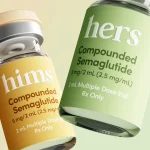
- HealthTech
Beckley's Depression Drug Shows Strong Phase Trial Results
6 minute read

Depression drug breakthrough by Beckley Psytech shows double the symptom reduction in latest clinical trials for treatment-resistant patients
Key Takeaways
- Beckley Psytech’s BPL-003 achieves significant depression reduction — Phase 2b trial shows 12.1 and 11.1 point reductions on MADRS depression scale versus 5.8 points for low-dose comparator in 193 treatment-resistant depression patients
- Psychedelic therapy market expands rapidly — Global market estimates range from $3.12 billion to $21.9 billion for 2025, with double-digit compound annual growth rates projected across the sector
- Regulatory momentum builds with bipartisan support — Johnson & Johnson’s SPRAVATO ketamine spray approval in January 2025 signals regulatory acceptance, while appointments under health secretary Robert F. Kennedy Jr. include psychedelics advocates
Introduction
Psychedelic therapies are advancing toward mainstream medical acceptance as clinical trials demonstrate substantial benefits for patients with treatment-resistant mental health conditions. Beckley Psytech reports significant results from its Phase 2b trial of BPL-003, an intranasal psychedelic compound that reduced depression symptoms by more than double compared to control groups.
The breakthrough comes as the psychedelic therapy sector experiences unprecedented growth and regulatory support. Companies including Beckley, Atai Life Sciences, and Compass Pathways compete to bring these treatments to market, targeting the $16 billion global depression treatment market projected by 2027.
Key Developments
Beckley’s BPL-003, an intranasal formulation of mebufotenin related to DMT, met both primary and secondary endpoints in its 193-patient Phase 2b trial. Participants receiving the active treatment showed depression score reductions of 12.1 and 11.1 points on the MADRS scale by day 29, significantly outperforming the 5.8-point reduction in the low-dose comparator group.
The company previously demonstrated rapid antidepressant response in 55% of patients within two days in its Phase IIa study. The open-label trial of 12 subjects with moderate-to-severe treatment-resistant depression showed sustained remission nearly a month after a single 10mg dose, with mild to moderate side effects and no serious adverse events.
Beckley plans to extend its Phase IIa study to include patients on stable oral antidepressants, evaluating BPL-003 as adjunctive therapy. The upcoming multi-center Phase IIb trial will test medium and high doses versus sub-perceptual doses in 225 treatment-resistant depression patients, with results expected in the second half of this year.
Market Impact
The psychedelic drugs market demonstrates robust expansion with estimates ranging dramatically based on scope and definitions. Conservative projections place the 2025 market at $3.12 billion, while broader assessments reach $21.9 billion, reflecting the sector’s nascent but rapidly evolving nature.
Johnson & Johnson’s SPRAVATO approval in January 2025 validates the regulatory pathway for psychedelic-based treatments. The ketamine-based nasal spray’s market entry signals growing acceptance among regulators and healthcare providers for novel psychiatric interventions.
Strategic partnerships accelerate development timelines and manufacturing capabilities. Cybin Inc.’s collaboration with Thermo Fisher Scientific for CYB003 drug manufacturing exemplifies industry efforts to scale production and navigate complex regulatory requirements.
Strategic Insights
Treatment-resistant depression represents a high-value market segment with significant unmet medical need. Current standard-of-care treatments achieve long-term remission in fewer than 15% of patients, creating substantial commercial opportunities for effective alternatives.
North America dominates the psychedelic therapy market due to progressive research policies and regulatory frameworks. The region’s proactive approach to clinical development and policy changes positions it as the primary growth driver for sector expansion.
The single-dose treatment model differentiates psychedelic therapies from traditional antidepressants requiring daily administration. This approach potentially reduces healthcare costs and improves patient compliance while delivering sustained therapeutic benefits.
Expert Opinions and Data
Beckley Psytech CEO Cosmo Feilding Mellen emphasizes the transformative potential of their treatment approach. “A single dose of BPL-003 delivered a rapid and durable antidepressant response in patients with treatment-resistant depression,” he states, highlighting the stark contrast with conventional treatments where “less than 15% of patients with treatment-resistant depression achieve long-term remission with the current standard of care.”
Complementary research from Beckley Psytech supports broader psychedelic applications. A phase 2 psilocybin trial with 28 cancer patients showed sustained depression reductions in 53.6% and anxiety reductions in 42.9% of participants two years after treatment, demonstrating durability across different compounds and patient populations.
Dr. Manish Agrawal of Sunstone Therapies leads ongoing randomized, double-blind trials evaluating two psilocybin doses versus placebo, aiming to establish definitive long-term benefits. These studies incorporate comprehensive psychological preparation and safety protocols to address the powerful transcendent effects of psychedelic compounds.
Conclusion
Psychedelic therapies transition from experimental treatments to viable medical interventions as clinical evidence accumulates and regulatory barriers diminish. Beckley Psytech’s positive Phase 2b results contribute to growing momentum across the sector, while strategic partnerships and manufacturing agreements position companies for commercial readiness.
The convergence of strong clinical data, substantial unmet medical need, and supportive regulatory environment creates favorable conditions for market expansion. Treatment-resistant depression patients represent an immediate target population, with broader psychiatric applications under investigation across multiple companies and research institutions.








